Diversity in the digital world: the Amazon Future Engineer program continues with EPITA!
This is the story of baseless preconceived notions, which have been rooted for far too long in France. It is a story that makes young girls believe that digital professions are not for them, that the IT world would not give them a sense of personal and professional satisfaction, and that this field is exclusively reserved for men. It is precisely due to this unfortunately widespread idea, that the Amazon Future Engineer program was created, designed to break down stereotypes about women and computer science from a very young age, using several different mechanisms.
Launched in 2020, in partnership with the IONIS Foundation and Article1, the part of the Amazon Future Engineer program dedicated to higher education has enabled 30 young scholarship holders to prepare for an ambitious career by joining EPITA and Epitech Technology, thanks in particular to financial aid of up to €7,500 per year. As the second season of the program kicked off in September 2021, allowing 30 new female students to get started, the program’s stakeholders met at the IONIS Group’s digital and creative campus in Paris on October 21 to remind them of the importance – and urgency – of such an action.
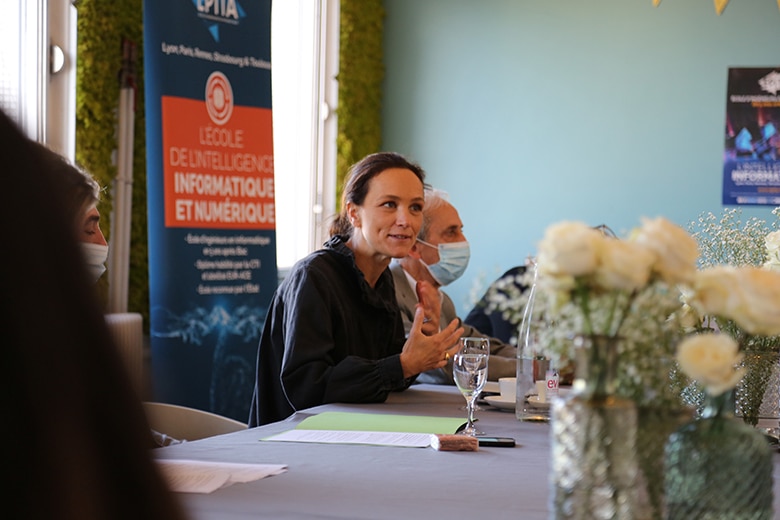
Elise Beuriot
Elise Beuriot, Amazon Future Engineer program manager:
“Amazon has embarked on the Amazon Future Engineer adventure with a view to promoting greater equality of opportunity in terms of accessing digital and IT professions. The program is comprised of a variety of activities with multiple levels, starting with children as young as 6 to young adults, ages 25 and under, who are finishing their studies. The activities begin in elementary school, overseen by our associative partners, and then extend to middle school, high school and, finally, to EPITA and Epitech Technology with the IONIS Foundation, to support young women who wish to study in these schools.
The results of the first year of this program have proven to be positive, with 30 young women receiving support and 25 having entered the second year of their program. This has motivated us to continue by taking advantage of the increased awareness of the program among future female high school graduates eligible for the scholarship. This has required more work from our partner Article1 to select this new class, also allowing for a more equal distribution between the two schools. Although more female students joined EPITA than Epitech Technology in the first year, the second class is well-balanced, with 15 female scholarship students per school.
I am personally delighted to see that the students involved all seem extremely enthusiastic and convinced that they belong here! Of course, it is important to remain humble, but if we could play even the slightest role in allowing them to thrive and forge their own path in these schools, it would be greatly satisfying. I am thrilled to have met them and to have had the opportunity to hear their stories!“
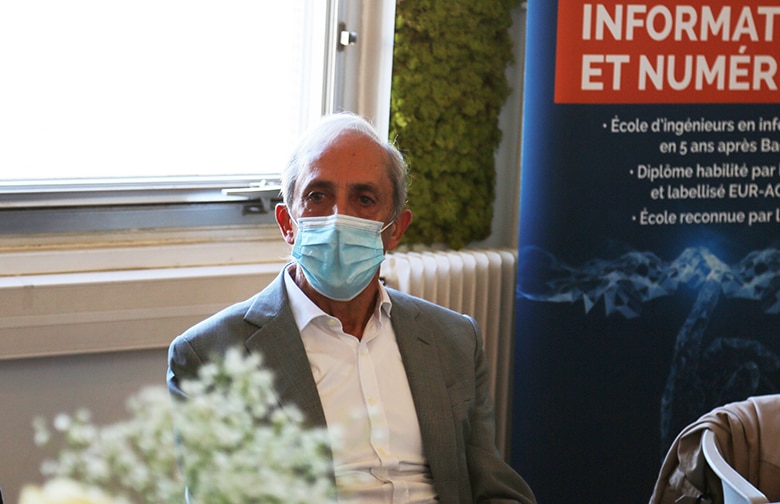
Fabrice Bardèche
Fabrice Bardèche, Executive Vice President of the IONIS Education Group:
“This partnership aims at providing a solution to two problems that we are confronted with in our IT schools and, more generally speaking, in our technology schools: the fact that there are so few women – and even fewer signed up for IT courses – as well as the lack of social diversity. We started to address the issue of increasing the number of women working in the IT sector about 20 years ago, with several initiatives, such as the Trophée Excellencia at EPITA. This was launched to show young women that there are excellent career opportunities for them in IT and that this field is not solely reserved for young men, quite the contrary. Social inequalities are also closely linked. Both EPITA and Epitech Technology are private schools. It is not easy for certain modest families to finance these studies for their children. Of course, there are already state scholarships that may be used to finance studies in our schools, but they do not cover everything. These families still have many expenses: part of the tuition, housing, food, etc. This can be difficult. In fact, this collaboration with Amazon allows us to target these two aspects: greater diversity in the IT sector and providing support to underprivileged families. And I feel that Amazon is effectively tackling the problem by acting on several fronts. Indeed, with the Trophée Excellencia at EPITA, we target students before they begin their post-Baccalaureate studies. Even if this works, it is not enough to break down the cultural preconceived ideas that have already taken root at the time of the Baccalaureate exam and more generally, during high school. Young girls already tend to know that they want to work in the fields of medicine, social services, education, law… while boys more often choose technology, engineering, etc. At this stage in their lives, they frequently have a general idea of what they want to do on a professional level. That’s why it’s so interesting to see Amazon addressing this issue in the first grades of elementary school with this program. I hope that over time this will contribute to a grassroots movement in society.
It is also important to remember that a lack of diversity leads to caricatured stereotypes. We saw this, for example, in the first video games, which depicted a very masculine environment and often only proposed male characters. We had to wait quite a few years before an increasing number of games included more female roles, even though many are still very masculine. In addition to video games, this lack of diversity is found in all areas of society. As a result, this masculine approach – in values, organization, reasoning, etc. – is found in computing, including strategic orientations. Nowadays, IT is present on all levels and in all sectors of the economy, even in areas that influence political decisions. If we really want those who make decisions in our society to be diverse, they must also be highly skilled in computer science. This is an absolute necessity for society.“
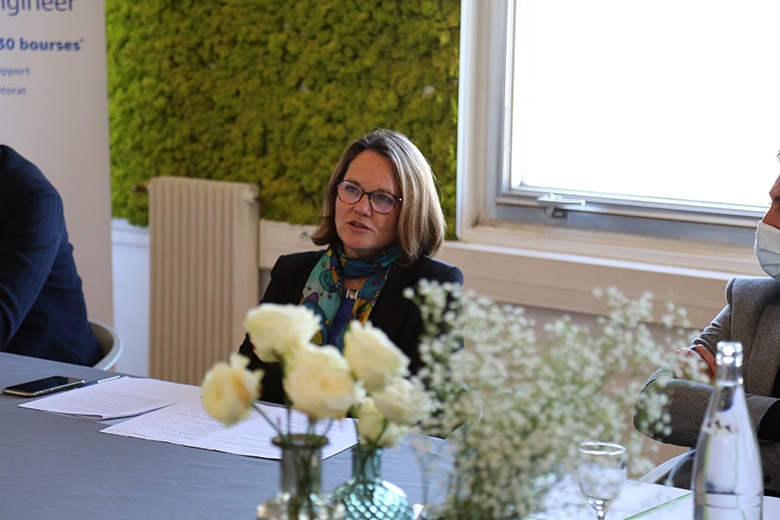
Claire Lecocq
Claire Lecocq, Assistant Managing Director of EPITA Paris:
“Women’s role in the digital sector is an extremely important issue, and one that now affects all parties involved, even if the problem did not begin yesterday. We have allowed this imbalance in gender diversity to deteriorate and are collectively realizing today that, in both companies and schools, all forms of diversity – social, cultural and gender – create value. It is therefore time to fight against this lack of diversity in our organizations. Moreover, not targeting women means that we are depriving ourselves of half of the talented workforce in the digital sector, which is particularly unfortunate at a time when digital engineers are the ones who are playing a major role in transforming society! And, as women make up half of our society, why not directly involve them in these changes? They can offer different solutions, different views and different management methods.
Although it is still recent, the Amazon Future Engineer program boasts a very positive track record as it has already enabled several young women to finance their engineering studies. This is important when we know that several sociological studies show that families may choose to pay less for their daughter’s education rather than their son’s, when faced with such a choice. With this program, not only do we give girls access to digital studies, but also to the very best schools, so that they may hold future management positions in this sector. This has a real two-fold impact.
Thanks to the program, we have been able to open the doors of EPITA to young women who, without it, would likely never have applied to the school due to their social background, and hence lack of finances. It is important to know that these young women often have to work to finance their studies or take care of their brothers and sisters… They show incredible courage and succeed despite everything, even if it takes a little longer and they need special support. Out of the first 20 students who were part of the program last year at EPITA, in the unfortunate conditions due to Covid-19, 3 dropped out and 2 took their first year over again, but we are sure they will succeed. To achieve this, we rely on dual support. The first is the mentoring program provided by Article1, with professionals who work in the digital field and are familiar with its codes. This is very important because these young women may not have had the opportunity to learn the codes of engineering, IT, as well as these professions due to their social background. The second is linked to the school: we must allow the students to feel at ease in the educational program in order to ensure their success. There are fewer than 12% female students at EPITA, which is still far too low. As they are a minority, we must provide twice as much protection and support. Of course, we are constantly working on improving our students’ educational experience, but this focus must be even more imperative for young women. We are setting up support groups, discussions, synergistic actions, conferences, a Discord group specially dedicated to them… The news regularly shows that sexual and sexist violence exists in all sectors and the world of higher education is no exception. We must be aware of this. The EPITA management team absolutely strives to protect our young female students, so that they may enjoy a rewarding and well-rounded education at our school!
If we want more women to choose a career in digital technology, we must show them that they are capable of doing so at a young age. It’s a great opportunity to be a woman working in the digital world, as they have a major role to play in this sector. At EPITA, by supporting the Prologin association, which organizes the GirlsCanCode! internships, we are already giving middle and high school girls the opportunity to experience coding. With Trophée Excellencia, we encourage exceptional high school girls to join us. The question of role models is important: young girls must have female role models in the digital world with whom they can identify.
It is absolutely necessary to eradicate stereotypes, because the digital engineer is not reflected in the cliché of a sad, dreary man sitting behind his keyboard!“
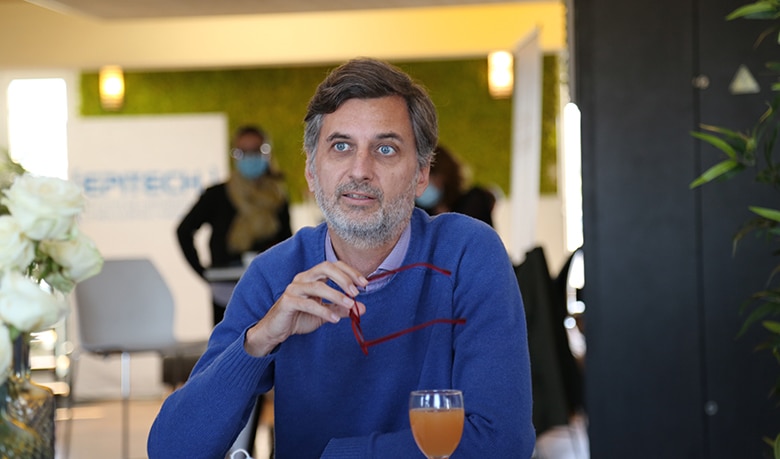
Charles-Henry Choel
Charles-Henry Choel, Director of Student Programs at Article1:
“Women engineers are confronted with a myriad of inequalities. Gender inequalities in the technological environment, social inequalities – hence the importance of scholarships and mentoring – and, very often, inequalities linked to a much greater mental burden than for men. For example, we have a mentee who has had to take on a job in addition to her studies as her mother has fallen ill, and another who has to look after her younger brothers… In short, we are dealing with triple discrimination against women from working-class backgrounds, which is what we are trying to make up for in part with Article1. Connecting them with mentors helps them to become increasingly motivated and better organized. During the Covid-19 health crisis, not all students had the same living conditions, in which they could work peacefully, or even a single room to enjoy some quiet time.
When you live in a small space with several people, you need even more support. In collaboration with our partners at Article1, we were also able to provide our mentees with computer equipment – more than 500 computers were donated. Unfortunately, there is a real digital divide and many young people do not have good computers and hence, good working conditions.
Yet, beyond this support, the relationship between the mentor and the student is enriching for both parties. It is really interesting to hear mentors explain that they started taking specific courses because their mentees encouraged them to do so! This is what we call “reverse mentoring”, when the mentee teaches or encourages the mentor to learn new subjects. It’s an interpersonal relationship that develops for both parties, each of whom has so much to learn from the other.“
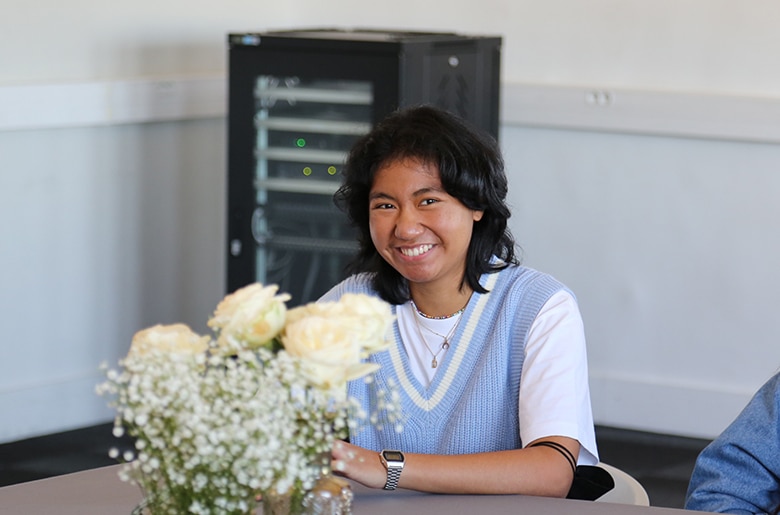
Djunice Lumban
Djunice Lumban (EPITA class of 2025), 2nd year student at EPITA Paris and Amazon Future Engineer scholarship holder since the first season:
“Although I grew up in the 15th arrondissement of Paris, my parents are emigrants of Filipino origin. Without this scholarship, I wouldn’t have been able to attend EPITA because my parents wouldn’t have been able to pay for the five year program – €10,000 per year is not affordable for everyone. I could have taken out loans from the bank and obtained an engineering degree by other means, but it would have been more complicated to pay back the loans this way. Receiving this scholarship was really a great opportunity and I jumped on it!
Honestly, the first year at EPITA was not easy and I wasn’t sure if I would be able to succeed. There was a project I had to turn in and I didn’t know if I could do it. Fortunately, I was able to count on my mentor who encouraged me to continue. Thanks to him, I felt less alone in my work. I realized that I had to, first and foremost, believe in myself. I was also able to count on the support of those around me, including my family, who are always there for me. Every day, my mother would tell me: “You can do anything, if you put your mind to it!” I hung in there and worked hard to get through the first part of the program!
Computer science is an integral part of our daily lives and will be omnipresent in the future! In high school, I initially wanted to go into aeronautics. I then chose computer science because I thought that it would be useful in many fields. So, I wanted to make it my profession. Today, I’m more interested in Data Sciences and Artificial Intelligence, but we don’t know what tomorrow holds. Each day at EPITA, we learn new things, and discover new fields and professions… I still have time to decide which sector I want to focus on!
It is important for me to be able to speak about my experience. I hope that it will allow other girls to find their niche and help the program’s new beneficiaries succeed in their first year at EPITA! By the way, I am also part of the Becometech association, which introduces girls to computer science. I advise young girls to watch “Hidden figures”, a film that shows women working in this sector. It inspired me and made me want to continue. I told myself that if they managed to succeed in this field, there was no reason why I couldn’t do it myself! I had to give it a try!“
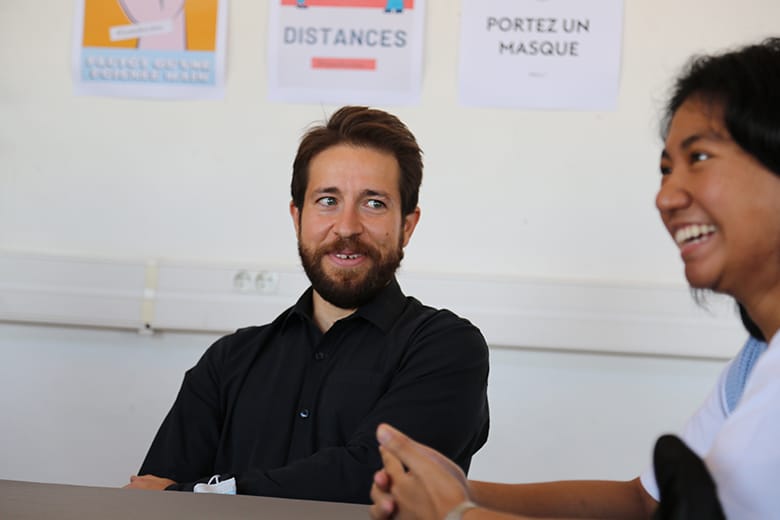
Matteo Mariani
Matteo Mariani, strategy account manager at Amazon and Djunice’s mentor:
“I discovered Article1 through the partnership with Amazon, which put us in touch with people from the association. I was able to take a course on both mentoring and the Amazon Future Engineer program. Afterwards, Article 1 sent us, the mentors, the contact information of the young women we would be mentoring. I sent an initial email to Djunice to introduce myself. It took some time for us to really connect, but we have been corresponding regularly now for almost a year and a half. I try to structure our exchanges because the mentor is also there to oversee this relationship and provide concrete examples of what the professional world is like. So, we speak at least once a month. I generally begin by asking her how her classes are going and how the last few weeks were, before rapidly addressing more human issues. I try to teach her new things and provide a methodology, allowing for a longer-term vision. I sometimes make long speeches – maybe too long (laughs) – about what her future profession or tomorrow’s business world will be like, so that she doesn’t get stuck in a purely academic rut. I also listen to her a lot. Overall, I try to keep a 50/50 balance between speaking and active listening, as well as between professional and personal subjects. It’s important that she can talk to me about potential problems and what she’s going through, especially with the difficulties linked to Covid-19!“
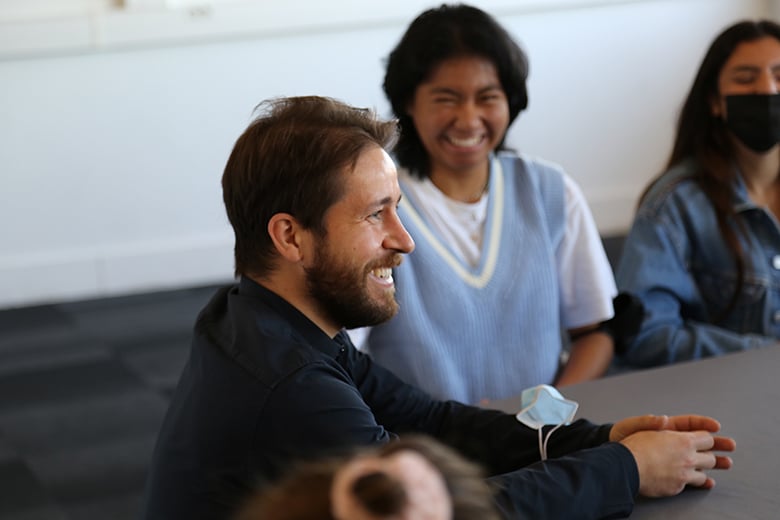
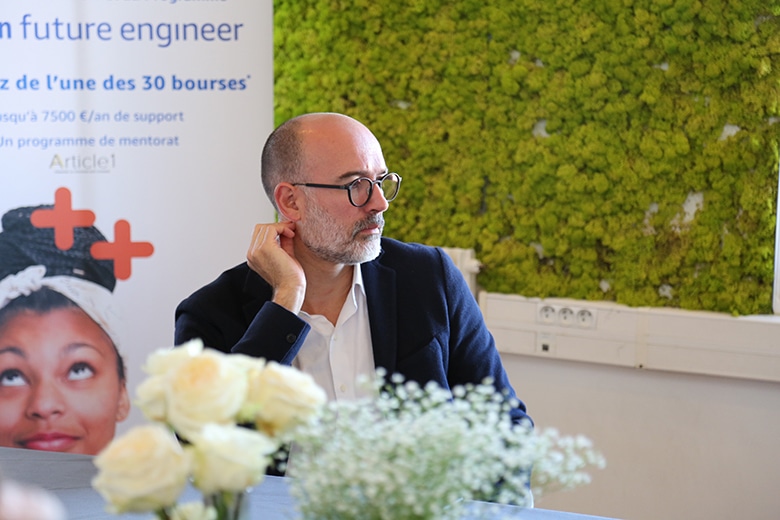
Emmanuel Carli, Managing director of Epitech Technology
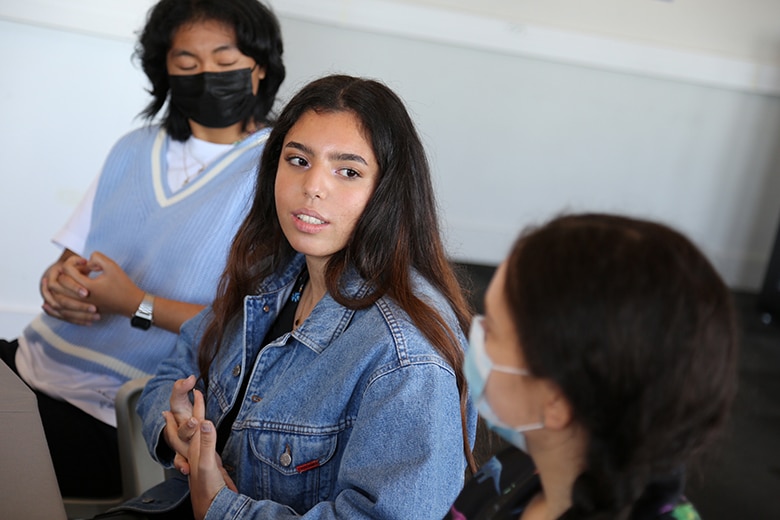
Hajar Guirane (Epitech class of 2026), a first-year student at Epitech Technology Marseille and new scholarship winner of the Amazon Future Engineer program
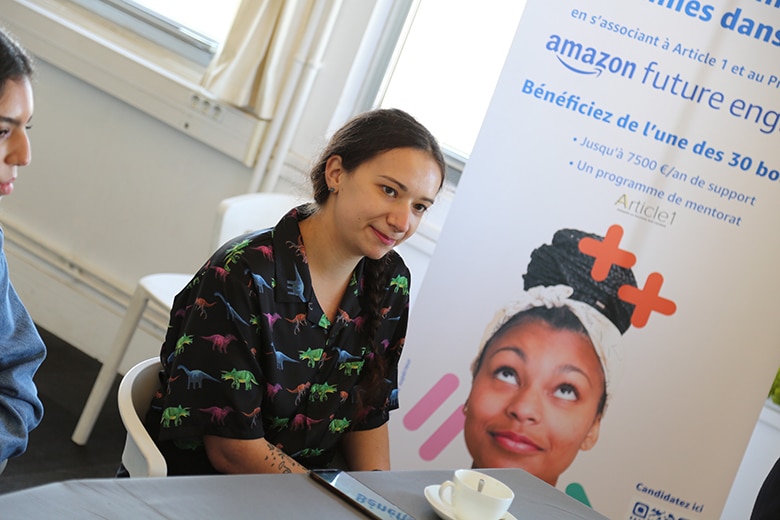
Amélie van Waerbeke, marketing specialist at Amazon F3 and mentor of Hajar Guirane

